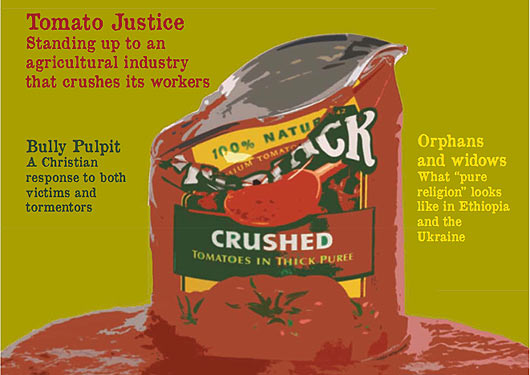
Prism Magazine: “Field hands, faith groups, and ordinary citizens are demanding justice from an industry that squeezes the lifeblood from its workers.”
A great new, in-depth look at the situation of farmworkers and the Campaign for Fair Food is the cover story in this month’s Prism Magazine, the publication of Evangelicals for Social Action. It is a must-read article that you can find here in pdf form. Here’s an excerpt, describing the first of what would become many pray-ins at Publix, which took place just ahead last fall’s bike tour to Publix headquarters in Lakeland:
| “At the start of the trek, a small group of Christian allies convened at a Publix store in North Naples, Fla., along with Wilson Perez and another farmworker.25 They gathered in the produce aisle to pray that Publix’ management would have a change of heart.
Among those present for the “pray-in” was author, speaker, and Christian activist Brian McLaren. “It was a great event,” he told me. “It brought together clergy from the area at a very local level, and allowed us to make a statement to the management of the store, to the CEO, and to the public at large. “It was respectful, not vengeful,” he added. While there is danger in praying to be seen, at times it is the faithful thing to do, said McLaren, referencing the biblical account of Daniel who defied the authorities of his day in order to pray publicly to the one true God. “By all accounts I have heard, Ed Crenshaw and his family are committed Christians and wonderful people—so we hoped that prayer is a language they would understand.”26 At the end of the pray-in, members of the group each purchased tomatoes and filled a standard 32-pound bucket like the ones used in the fields. Demonstrating that Publix could easily spare an extra penny per pound, that full bucket—for which a typical farmworker would earn 50 cents—cost $79.63 at the checkout. |
The article ends with this:
| “The rules of the game
Our economy is built on the law of supply and demand, and the tomato industry is no exception. The fact of the matter is that we will keep demanding tomatoes, and supermarkets—like fast food chains and food service providers—will continue to supply them. But we can demand more. We can demand that the tomatoes we purchase contribute to the dignity and wellbeing of those who pick them; slavery cannot be tolerated anywhere in the supply chain. We can demand that farmworkers be paid a penny more per pound—at least minimum wage. We can demand that tomatoes are grown with reasonable precautions; for starters, workers shouldn’t be sprayed with pesticides. And we can demand that workers’ voices are heard and that they are respected as key players in the tomato industry. When demand for tomato justice is strong enough—and it’s getting stronger by the day—supermarkets will have no choice but to supply it.” |
Take a moment to read the whole article, you won’t be disappointed.
